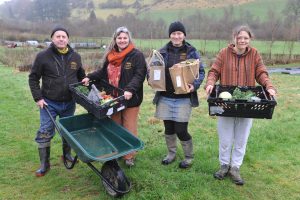
ADDRESSING farmers at the Oxford Farming Conference last week former DEFRA minister Owen Paterson described the upcoming vote on whether Britain stays or leaves the EU as the biggest historic decision since the Reformation.
But he suggested some farmers were suffering from Stockholm Syndrome – where hostages have positive feelings towards their captors – and would rather remain prisoners of the EU than exert British power and influence on the world stage.
The former Secretary of State, now a leading campaigner on the Conservative benches to get Britain out of the EU, rubbished the idea that farm subsidies would be radically cut by the Treasury if Britain left the Union.
He said: “Outside the EU it will be essential to continue a significant level of support from the UK Exchequer and to reassure farmers that payments would be made by the UK Government in the same way that non-EU members like Switzerland, Norway and Iceland currently do.
“In fact the payments made by these countries are actually more generous than those paid by the EU to member states.”
And questioned after his speech on what guarantees there would be that farm subsidies would be a priority for the Treasury, when measured against other budgets for services like health and education, he was dismissive of concerns because it suited his agenda to be so.
He pointed out that farming, food and drink was the biggest manufacturing industry in the UK, contributing £85 billion to the economy, and that every MP in the country would have businesses in their constituencies clamouring for support. He pointed out the EU currently spends £2.9 billion a year in farm subsidy for British farmers and the UK would be saving £9.8 billion in payment to the EU. He suggested there would be the potential to give even greater support to the rural economy in the event of Brexit.
And he said that as the fifth biggest economy in the world, Britain, going it alone, would get a seat at the table in global discussions on trade deals – rather than being represented by the EU as just one 28th of the European Union.
Mr Paterson told CLA President Ross Murray, who posed a question from the floor, that he was “very pleased” Prime Minister David Cameron had allowed Cabinet Ministers to campaign for Britain to leave. “This is not an internal Tory party row,” he said. “We have got support all across the country.” He said the polls and public opinion indicated the likelihood of a vote to leave was growing and a responsible UK government needed to prepare for that eventuality.
And he told NFU president Meurig Raymond that the British public trusted its government to spend money on defence, health, education and other services and it should trust them to keep up support for farming and the rural economy too, given its importance to the economy, the environment and the landscape.
Some commentators have pointed out that Mr Paterson’s record on predicting the future is a little less than stellar. While in charge of DEFRA, he piloted massive cuts to the UK Government’s flood prevention plans: the sort of policy success that led to his removal from the Cabinet in April 2014.
Mr Paterson’s confidence about the ability of Britain’s rural economy to thrive outside the EU was challenged by EU Agriculture Commissioner Phil Hogan who warned Britain, with a population of 60 million, was too small to win a place at the world negotiating table settling key issues on global trade.
And he asked farmers, on the second full day of the conference – now in its 70th year and a key talking shop for the agricultural industry – if they could be confident of getting the support they needed from their own government, when Defra’s budget had been cut by 24% since 2010 while the EU’s had fallen by just 3%.
Mr Hogan said he was actively working to get some of the changes Britain wanted to the Common Agricultural Policy – like an end to onerous ‘greening’ rules and the three crop rule. And he said Britain already got its way 75% of the time on EU issues. Mr Hogan also suggested it was sometimes the British government’s own fault that it failed to get a better deal when it came to amending policy.
He said: “The NFU was correct recently when it pointed out that national “gold-plating” of EU legislation imposes an extra burden on British farmers and that, in the words of Deputy Director General Martin Haworth, “some of the most difficult regulations are national regulations.”
Mr Hogan said it was not his job to tell British farmers – or the public at large – how to vote in the in-out referendum when it is held, probably later this year.
But he concluded: “How would Britain with a population of 60 million fare in negotiating with countries like China, with a population 1.3 billion? In the EU it punches at a weight of 500 million, almost twice the size of the US. It could take the UK years to negotiate deals with Korea, Canada and so on – deals the EU has already successfully negotiated.”
Mr Hogan told the conference: “I remain adamant that the stability brought by the Common Agricultural Policy has provided, and is providing, the foundation for economic growth and jobs in rural areas and all along the food chain.”














Add Comment